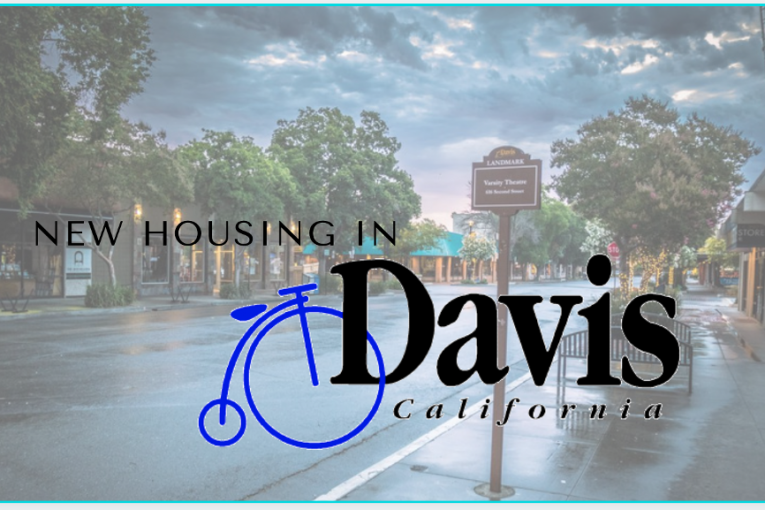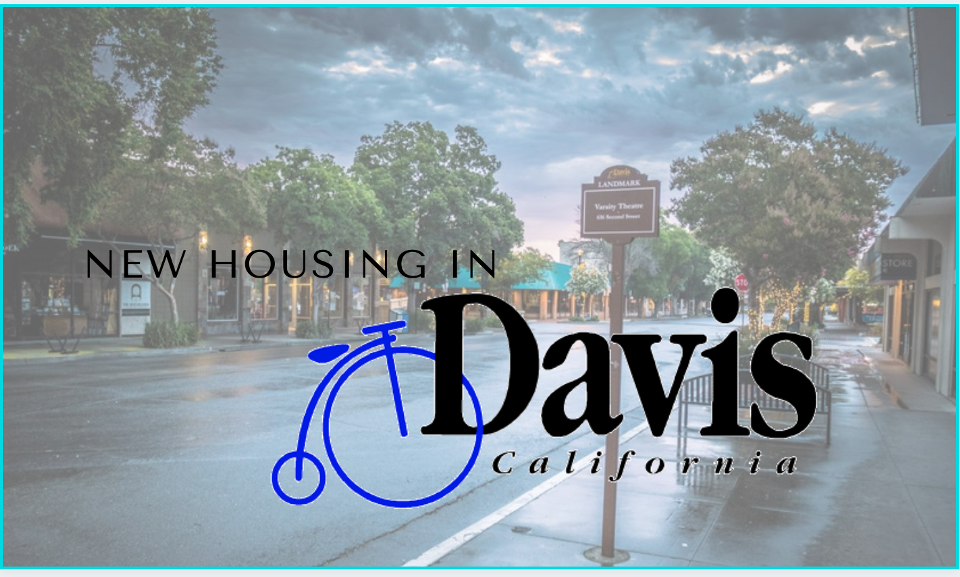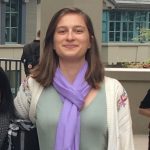

By Pavan Potti, Linh Nguyen, Lauren Smith, and Jordan Varney
The Davis Vanguard recently hosted their monthly webinar on Mar. 29, which centered around new housing plans for the city of Davis.
The webinar panelists included Mayor of Davis Gloria Partida, Social Services Commission and Housing Element Subcommittee member Georgina Valencia, Housing Element Subcommittee member Don Gibson and former candidates for City Council Larry Guenther and Kelsey Fortune. The panelists engaged in an active discussion over some of the challenges faced, while also sharing their main goals and objectives for building new housing units in Davis over the next decade.
The first question asked was what kind of housing is needed in the city. Valencia and Partida agree that the housing needs must cater to the city’s demographics. Furthermore, if most of the living spaces will be for rent, they must account for any populations that may be excluded since the purpose of affordable housing is to give renting opportunities to a broader group of people.
“We don’t want to squeeze out middle-aged people and younger families,” Partida said. “Housing goes with economic development. We need to increase housing to go with economic development. This applies to people who are fresh graduates or are starting families.”
Valencia also accounted for the cost of architectural variation, suggesting that auxiliary dwelling units for rent are also an option.
Gibson pointed out that affordable housing has always been a problem in Davis, raising the concern that without an increase in housing for the next two decades, it will be difficult for people who work in Davis or are connected to Davis since they might not be able to live here.
Fortune stressed that the city must consider two things. The first is that much of the city is centered around the university, meaning that the students living here should be able to commute to where they want to be. This is also important for small businesses and their employees. Guenther also noted that UC Davis on-campus residents consist half of students and half of faculty, therefore housing must be affordable to both groups.
The second question asked where housing should be built and if the city is seeking density in neighborhoods.
Gibson noted that the city of Sacramento recently implemented the “most progressive housing policy,” in which reformed city zoning now allows up to four units on a single-family lot and eliminated parking minimums. Meanwhile, Davis can be condensed by building large, student-oriented apartment complexes, though this is not going to solve the problems. Gibson stated that small increases in density will help the city.
“Densifying our neighborhoods is a great idea until people start complaining about parking,” Partida said. “Previous neighborhoods across from campus expressed concern with this densification. There has also been concern over modern architecture not ‘fitting in’ with neighborhood vibes.”
Valencia revealed that a vote showed that people in the city want it to be the way it was for the most part, though parks and open spaces need to be considered since not all of those areas are utilized. For example, Wildhorse Park is large in size though not many people visit it. However, the city must ask the landowner for permission to renovate the space.
“There are view corridors between single-family homes that can be built in Wildhorse,” Valencia said. “There is also commercial space on the south side of Davis outside of the freeway. We do have land space within the community, which means giving up some things. You don’t get everything without giving something.”
The University Mall, which will be closing, is also a space that the city is considering for development.
“From my perspective, there doesn’t seem to be great engagement with city developers and neighborhoods,” Guenther said. “The University Mall’s issue was massive in scale, which was a design problem. Getting the developers in the room with the neighbors seems like a really good way to move forward.”
Partida also agreed on the importance of good relations between neighborhoods and developers, though neighborhoods rarely agree with the ideas proposed by developers.
“We had this problem with Pacifico,” Partida said. “A whole lot of people didn’t come back because the only thing that they could pencil out was something big. The neighborhood didn’t support something big. It just doesn’t work. We live in a place where construction is extremely expensive. Businesses are leaving because it’s becoming increasingly hard to house all their workers. This is a problem we need to work on together.
Support for affordable housing, or the “million dollar question,” said Valencia, comes from “incentivizing it.
“We need to, as a city, start actualizing a sustainable problem to help people that are hopeless and are at risk of losing rental problems. If we don’t do this soon, it means we really don’t care about these people in need” she stated.
Guenther supported the idea of making “affordable housing a requirement moving forward;” however, he claimed that the “big issue” with affordable housing “is removing the affordable housing that already exists. Tearing (down) cheaper apartments and replacing them with expensive apartments is a big no.”
Mayor Partida suggested helping “people with down payment [by] supplementing the Vouchers program” which she claims “happens in other states.”
In response to a question about the importance of social change and environmental justice, Gibson clarified why it’s important that Davis address them. “Davis is one of the highest opportunity areas in the region,” he said. “You want to build houses in areas where it’s good to grow up in…We need to make sure that people who lack quality housing have it in Davis.”
Mayor Partida bolstered his point with saying “if you can get people to move out of areas with low opportunity and into Davis, a whole generation can be influenced. Changing the quality of life for everyone here is important.”
She also explained that these types of changes sometimes mean “making difficult decisions that some people may not agree with.”
The panelists offered some closing remarks. Gibson talked about forthcoming changes in Davis. He said “in the next few weeks we’ll be seeing the draft report of the Davis Housing element and hopefully we see some proposals that incorporate more housing supply.”
Valencia talked about what the public has been emphasizing. “People have expressed concern for change,” she said, “and our housing policies and community engagement don’t reflect that. Folks, we need to do something and we can only do that when we apply ourselves.”
Fortune followed that up with, “We need people to be living where they work and play. There’s no option at this point. We need to change. It’s not going to be easy but it has to be big.”
Guenther advocated for the folks in Davis who do not have time to advocate for their housing needs. “Engagement could be more effective in getting to a solution,” he started. “Young families don’t have time to really get involved in city council meetings even though they are a silent majority. They are silent because they are busy but they need to be factored in.”
Partida emphasized community members getting involved in the future. “I’m looking forward to our Housing element process. Engaging the community will help fix this problem,” she said.
“Get out there and get engaged,” Partida continued. “Zoom has lifted a lot of barriers and I’m looking forward to hearing where the priorities are for the community. I’m willing to follow these while making sure that the main goal is to get people housed in the Davis area where people can prosper.”

Pavan is a third-year student studying Economics and is from Fremont, California.

Linh Nguyen is a third-year Political Science student at UC Davis, also pursuing a minor in Professional Writing. She is an aspiring investigative journalist from San Jose, California, who also shares interests in literature and baking. She is co-editor in chief of the Vanguard at UC Davis.

Lauren Smith, co-editor of the city news desk for the Vanguard at UC Davis, is a recent graduate UC Davis, who double majored in Political Science and Psychology. She is from San Diego, California.

Jordan Varney is co-editor of the city news desk for the Vanguard at UC Davis. Received her master’s from UC Davis in Psychology and a B.S. in Computer Science from Harvey Mudd.





. . . and that Alan Miller guy in comments. He just would not shut up!
A few observations:
Davis has always had a price premium over other Yolo cities, largely due to the quality of the schools. (I can refer you to the journals articles that show this.) However, the housing price level for Woodland and West Sacramento have gone up substantially with the large new developments in the south parts of those towns. Yet the percentage price differential has remained the same over the last 20 years (about 85% on the median prices) instead of eroding as it should have given the relative rise of prices for Woodland and West Sac in their regional positions. That means that Davis has become less affordable over that period.
If we want to be serious about fighting climate change, we’re going to have to overcome objections to congested parking. Unhindered parking and reducing greenhouse gas emissions are in conflict with each other. Our leaders must tell residents that this is the choice that they face and that they need to be part of the solution to our global crisis. As it is, almost every existing single family home was originally built with enough on-parcel parking for two cars. Many residences have been modified to reduce that space, but that choice did not entitle those residents to on-street parking. They don’t hold a property right to a parking space on the street. Increased street parking congestion will incent residents to reduce the number of their vehicles. (Alternatively we could have paid street parking.) That’s exactly what we need in this community in our efforts to reducing GHG emissions.
The opposition to Pacifico has been drummed up by a very small group of neighbors, not a broad neighborhood group. That said, the project was not well designed from the outset and needs a substantial makeover. The City should be working diligently on fixing this problem, which is not about switching management companies, but rather a physical reconfiguration.
We need to be looking at more projects like the new U Mall proposal. If we really are the progressive community that we claim to be, we need to be building up in our core areas to increase density. To accomplish this, we need to develop a sustainable and resilient vision for our community and revise the General Plan as soon as possible to conform with what we need to accomplish. That will more clearly define what is acceptable and remove the absolute veto power that neighbors too often have over parcel redevelopment.
More nonsense. And, it’s not 85%.
Davis has also had new housing developments (e.g., in the form of the Cannery). How do you like them prices?
The only “correct” part of your statement is that the price differential has remained the same over the last 20 years. That’s what we call an “inconvenient truth”, for the development activists.
As it is, many families cram their garages so full of stuff that they end up parking in the street. Many families (especially those with kids) end up with more than two cars, as well.
Young families (in particular) likely drive more than any other cohort.
Families will continue to find the space (and parking) that they’re looking for in nearby communities (such as the new developments in the southern part of Woodland, some 8 miles from Davis). At a cheaper price. Regardless of what one thinks of it, that’s what will continue to occur.
So you are recommending ‘hindered parking’ ? Like, you get home and night and there is no place for your car?
Have a place to park your car, or be a very, very teeny weeny tiny part of the solution.
That isn’t true in the historic neighborhoods. There are several lots I can think of near me with no off street parking at all.
Let’s make it hard to find a place to park, yay!!!!
Not true at all. In fact, an official Oakshade neighborhood association was just established in that area this month. As well “opposition” is a seriously flawed term for this case. The issues are serious problems stemming from the complex and immediate area. Some of those working to change the situation support Pacifico, as such. The is a seriously mis-characterized situation, and the neighbor’s valid concerns painted with a cancelling brush.
Name a few places you think more projects like the new U Mall proposal should go. How close to your own residence would you be comfortable with a set of seven-story buildings?
I’m not.
We have more than one core area now?
How does 2070 sound?
What is it we are trying to accomplish here?
Acceptable to whom? The forced neighbors of a new U-Mall-style project, perhaps?
We neighbors have absolute veto power? Cool, when did they pass that law? About dåmn time. So that we can keep those 7-story U-malls-type projects from springing up next door. And be YIYBYs!!!
“Valencia revealed that a vote showed that people in the city want it to be the way it was for the most part, though parks and open spaces need to be considered since not all of those areas are utilized. For example, Wildhorse Park is large in size though not many people visit it. However, the city must ask the landowner for permission to renovate the space.”
Another unintended consequence of Measure D. Infill in the Park.
In the highly unlikely event that this occurs, that would be an “unintended consequence” from supporting the type of people elected to the council.
You’d think that voters would have learned their lesson, from Trackside, University Mall, etc. But, I doubt that even the current crop on the council would destroy a park.
The Dirty Harry phrase, “Go ahead, make my day” comes to mind. 🙂 (Though I kind of like the more subtle one better, “do you feel lucky . . .”?)
By “Wildhorse Park”, do you mean ‘Nugget Field’ @ corner of Pole Line and Moore? If yes, I have a LOT to say about that… a true ‘dark underbelly’…
I have no friggin’ idea what they mean!!! There is no such thing as Wildhorse Park. Hopefully, they’ll fill that entire giant golf course in with 7-story, U-Mall-style developments. If there’s one thing we don’t need is tens of acres of lawn sucking up water so a few people can knock tiny white balls around with fancy sticks.
DO TELL !!!!!!!
Fear of change no doubt. Pfffffffffffft! 😐
Such a shame for an ‘un-utilized’ park to go to waste. Solution: “Let’s develop it.”
Solutions: “Let’s develop it.” (if it existed, that is)
“Renovate” ? Is that what they are calling making an open-space into a seven-story U-Mall-style building now?
Well, then they wouldn’t be ‘view’ corridors anymore would they? More like ‘view of a seven-story, U-Mall-style development’ corridors. That ain’t much of a view.
Best not to consider the land inside the freeway. Cars might run into the buildings.
Land Space. As opposed to air space, water space, or outer space?
Pardon, what means giving up some things? The existence of ‘land space’ ? Whatever that is.
Therefore it follows, ‘if you give something, you get everything!’. Sounds like a good deal to me 🙂
https://localwiki.org/davis/Wildhorse_Park
(It’s full of giant, endangered sandworms, though.) 🙂
I assume that the reference was to Nugget Fields, a non-starter in a town that’s supposedly trying to appeal to “families”.
Still haven’t seen anyone discuss the reason that Chiles Ranch development (about 100 or so small single-family houses) has been “coming soon” for well-over a decade, it seems.